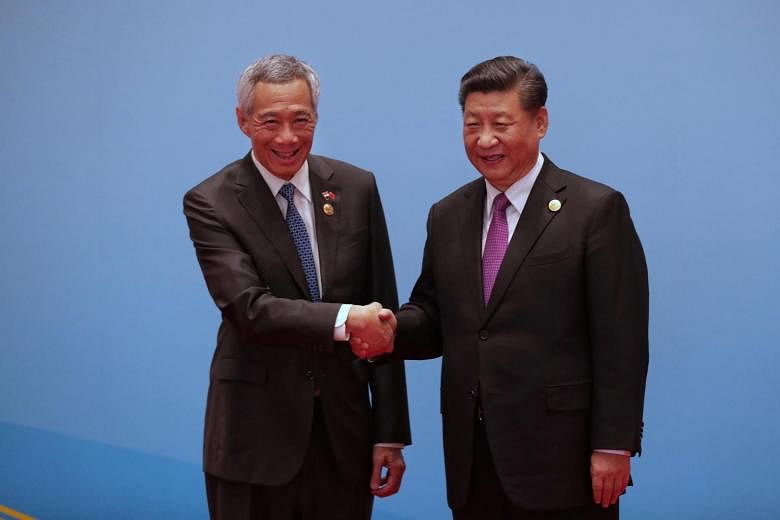BEIJING - China's Belt and Road Initiative (BRI) is a platform through which the country can assume a more influential place in the world, while at the same time fulfilling the expectations of other countries to contribute more to the global system.
Speaking at a Leaders' Roundtable meeting of the Belt and Road Forum in Beijing on Saturday (April 27), Prime Minister Lee Hsien Loong said that as China has developed and grown in influence, it is shifting the global strategic balance.
"How China performs its prominent global role, and how the international community adjusts to China's growing influence, will determine whether all of us, and all our countries, can enjoy continued peace and prosperity," PM Lee said.
The Prime Minister is on the third day of a five-day visit to the Chinese capital, where he is attending the forum for the first time.
Addressing the discussion, which was attended by 37 heads of state and government including the other nine Asean leaders, and hosted by Chinese President Xi Jinping, PM Lee said the BRI has deepened China's links with other countries.
Singapore has been working with China on projects like the joint-government Chongqing Connectivity Initiative, and promoting areas including financial connectivity.
The BRI, which envisions linking China to Europe, Africa and Asia through a network of ports, railways and roads, is helping to meet the infrastructure needs of developing countries, he said.
"New roads, ports and railways built under the BRI have enhanced physical connectivity between cities and countries, and in time should catalyse economic growth," said PM Lee, adding that for the next phase should focus on maximising long-term benefits.
He made three suggestions - for BRI projects to focus on developing indigenous capability; for China to partner other countries to work on projects in third-party markets; and to strengthen the BRI's inclusivity, transparency and market-driven approach.
Critics have raised concerns about the BRI, saying it saddles developing countries with unsustainable debt, pollutes the environment and benefits Chinese companies more than local ones.
On his first point, PM Lee said other countries will benefit more if BRI projects develop local talent, involve local businesses and transfer more technology - this will also boost the quality and sustainability of the infrastructure projects.
Second, China should also move beyond bilateral models of cooperation, or what PM Lee described as "hub-and-spoke" arrangements with China.
By working with others in third countries, new doors may be opened to projects that were otherwise not feasible, he said.
Lastly, by ensuring that projects are economically viable, it will in turn boost accountability, chances of success and confidence in future projects.
"A prospering region with China fully integrated linked together by an open regional cooperation infrastructure will reinforce the open, rules-based international order and multilateral trading system, which has benefited all of us," he added.
On Saturday, PM Lee also met Chilean President Sebastian Pinera who is in Beijing to attend the forum.
The Prime Minister's Office (PMO) said in a statement that both leaders affirmed their countries' relations and discussed urban planning and population issues.
Both leaders agreed to boost cooperation in digital trade and smart cities, said the PMO.


